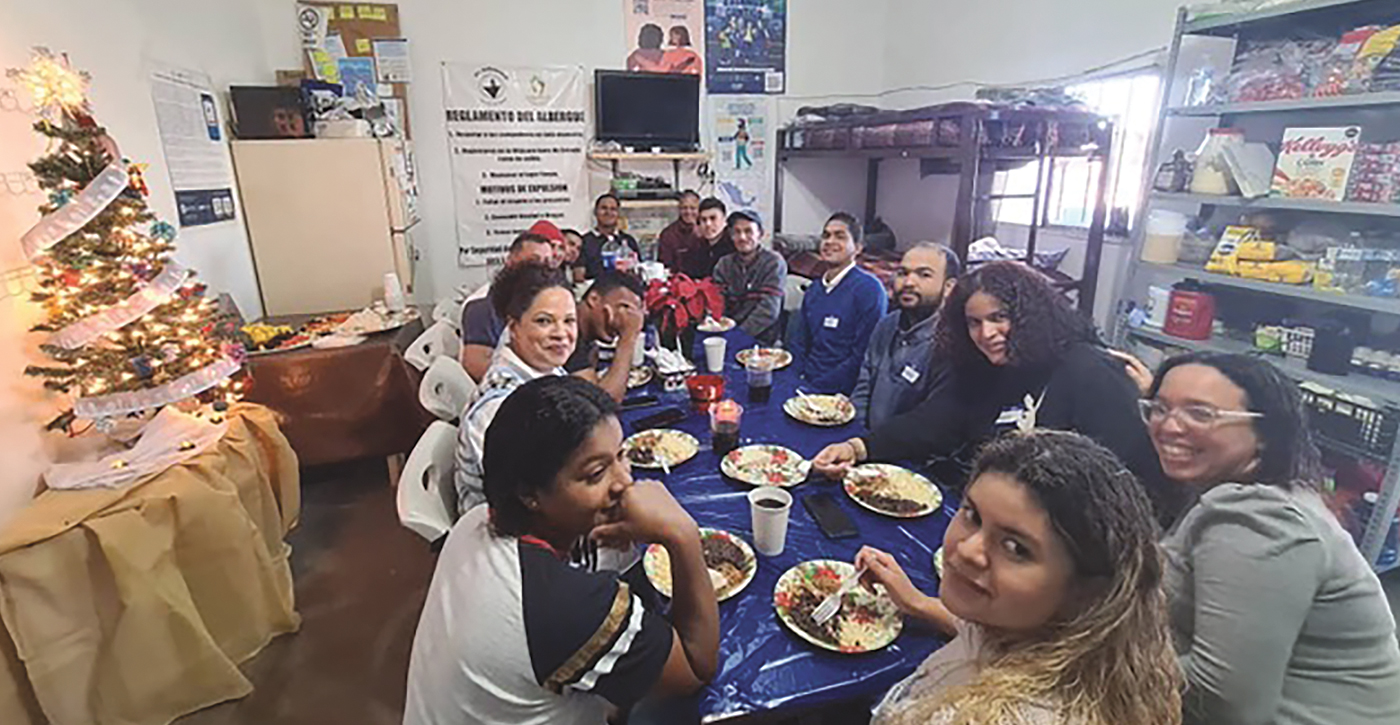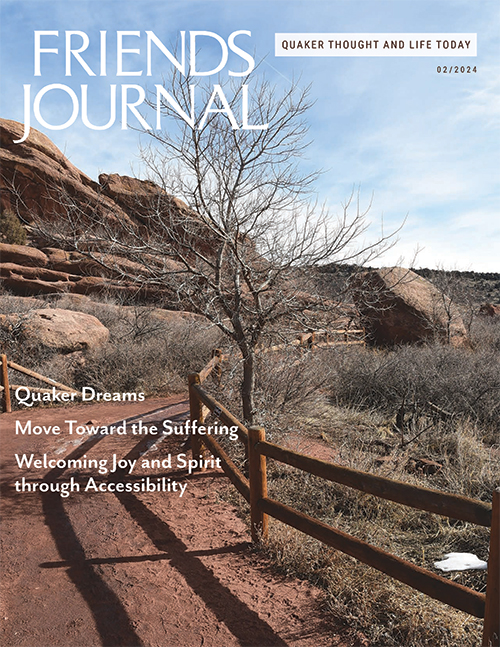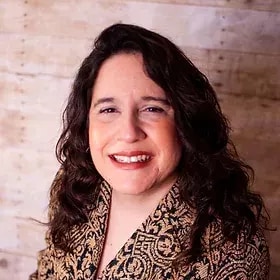Friends Across the United States Welcome Refugees and Migrants
Quaker testimonies of equality and community can motivate Friends to reach out to refugees and immigrants new to the United States. Some Quakers have a long history of helping newcomers adjust to life in a strange country. Others got involved in resettlement support in response to anti-immigrant rhetoric before and during the time of former President Donald Trump’s administration in 2017–2021. With the support of their meetings, as well as partnerships with other faith-based organizations, Quakers are lending their hands to people who have fled dire circumstances in their home countries and sought refuge in the United States.
In response to the Trump administration’s promotion of vigorous enforcement of deportation laws by Immigration and Customs Enforcement (ICE), Ann Arbor (Mich.) Meeting formed the Quaker Sanctuary Committee, according to Johanna Kowitz, the committee’s convenor. The committee met weekly for six months to work on a minute that stated the meeting would help immigrants avoid deportation. Many cities, including Ann Arbor, declared themselves sanctuary cities. Police departments in such cities said they would not do ICE’s work by deporting undocumented immigrants. Thirteen churches in the Ann Arbor area declared themselves sanctuary congregations.
Five years ago, Ann Arbor Meeting got a call about a man from Guinea who collapsed due to end-stage kidney failure as he was being deported, according to Kowitz, who is a member of Ann Arbor Meeting.
“The response from our meeting was, ‘How can we not do this?’” said Kowitz.
The man from Guinea, who requested anonymity, has since lived in the guest room of a house owned by the meeting, an arrangement negotiated with members of the intentional community who also live in the home. When the resident guest faced the threat of deportation, volunteers went to the house in three eight-hour shifts per day to support him in case ICE agents came to the door. Volunteers underwent training in which they learned not to open the door to ICE agents but to instead ask them to slide their warrant under the door. Volunteers also learned about the signatures needed to make warrants valid. Volunteers from the meeting collaborated with those from the other 12 sanctuary churches. One of the volunteers established a phone tree that would enable a supporter on-site to immediately notify all others if ICE agents arrived at the house.
The resident guest required dialysis three times a week, so volunteers drove him to the clinic. Although the clinic was a designated sanctuary, the man was not protected from deportation during the ride to it. The Quaker Sanctuary Committee arranged for clergy members to drive him in hopes that ICE stopping a person of the cloth would create bad publicity, according to Kowitz.
The resident guest could not go shopping, so volunteers bought his groceries for him, including the halal meat he required. He is proficient in speaking English, French, Wolof, and Susu but does not read or write, according to Kowitz. Congregations donated money to pay for his groceries, phone, medicine, and cable television bills. One volunteer handles the man’s insurance, and another donates bookkeeping services. The immigration law clinic at Wayne State University in Detroit provided pro bono assistance in exchange for allowing law students to observe legal proceedings.
The resident guest eventually attained a legal status that led to his being able to leave the house. He still needed dialysis but could do his own shopping as long as a volunteer drove him to the grocery store. His new legal standing enabled him to get on a list of expedited potential recipients for a donated kidney. After a year on the list, he received a kidney in late spring of 2022, according to Kowitz. Volunteers helped with his recovery by driving him to medical appointments. He no longer requires dialysis.
Supporting the resident guest during his serious health journey enriched volunteers spiritually.
“To the volunteers involved, for sure, it’s almost as if one sharpens a little match flame that says, ‘This is the right thing to do,’” Kowitz said.
With the support of their meetings, as well as partnerships with other faith-based organizations, Quakers are lending their hands to people who have fled dire circumstances in their home countries and sought refuge in the United States.
Xenophobic public statements inspired Quakers in other parts of the country to do similar work. In the lead up to Trump taking office, members of churches in southeast Minnesota became concerned about anti-immigrant rhetoric, so they formed a sanctuary network, and two churches remodeled their buildings to house migrants. Rochester (Minn.) Meeting joined several smaller churches that established themselves as sanctuary support congregations.
Michael Resman, a member of Rochester Meeting, volunteers to mail appeals to raise money for Southeastern Minnesota Interfaith Immigrant Legal Defense, an organization that provides attorneys to people in ICE detention and at risk of imprisonment and deportation. The lawyers screen about ten immigrants per month and offer legal advice to many more. Non-detained immigrants who do not have lawyers have a 7 percent chance of being released, but those with attorneys have a 68 percent chance of being freed, according to Resman, who cited a fact sheet from the nationwide anti-incarceration group Vera Institute of Justice.
“It’s quite sobering to realize the effects that this kind of work can have,” Resman said.
If parents are deported, it is likely that their children will never see them again, according to Resman. Advocates say migrant children are apprehensive about returning home after school because they fear they will find their parents deported.
Resman considers it God’s will for Quakers to help refugees and migrants, saying, “What I work to keep in mind always is ‘What does God want?’”
Reflecting on the living conditions of those fleeing their home countries to come to the United States prompted other Friends to welcome newcomers. Rebecca Richards, a member of Gunpowder Meeting in Sparks, Maryland, developed a concern for addressing the needs of refugees and migrants when she heard of new arrivals to the United States living in hotels with up to 15 people staying in one room. At meeting for business, she raised the issue of her meeting furnishing apartments for families new to the United States.
About 20 people from the meeting volunteered. Members of Richards’s meeting participated in the Welcome Home Project of the International Rescue Committee (IRC) by moving furniture and finding needed supplies. Richards and her wife contacted their fellow activists in the peace movement and other community organizations. They sent letters to friends who responded with donations of money and furniture as well as kitchen and bathroom items. Eventually, donated items filled Richards’s den and half of her son’s garage.
“I had a porch that was jam-packed end to end,” said Richards, who oversaw the meeting’s participation.
Meeting members and other volunteers provided apartment setups for nine or ten families, including a new mattress for each person. They purchased mattresses for around five more people, helping 15 or 16 families in 18 months. Volunteers put flowers on the tables of each apartment and provided grocery store gift cards. One woman gave her set of china to a refugee family. The IRC asked helpers to purchase two weeks of fresh food and staples for each family they welcomed. Participants in the resettlement activities appreciated caring for people who had been traumatized by losing their dear ones and homes.
The spiritual benefit to volunteers is akin to the satisfaction one feels when giving a perfect gift to a loved one, according to Richards. “It’s kind of a gift to the universe kind of thing,” Richards said.
Photos documenting apartments set up by volunteers for refugees outside Baltimore, Md. Apartment photos courtesy of Rebecca Richards.
Reports of events from earlier eras motivated other Quakers’ refugee support activities. Concerned about stories of people leaving Vietnam by boat after the Vietnam War, Nancy Mellor became interested in supporting refugees and migrants as a new member of Oxford (Pa.) Meeting. Having been a child during World War II, Mellor had a lifelong sensitivity to the needs of displaced people. She shared with the meeting her leading to sponsor a family.
Mellor and other Friends collaborated with Baltimore-based Lutheran Immigration and Refugee Service (LIRS) because it works in the same region as the meeting. The organization settles refugees and immigrants in communities nationwide. LIRS sent Mellor’s meeting bios and photos. The meeting community selected a family of six people.
“We made the decision in November, and they were with us in January. The whole meeting was involved,” Mellor said.
The family lived with members of the meeting in the early 1980s. In 1984, Mellor moved to California, and the family also moved to live with her and her husband.
Beginning about a year ago, two members of Mellor’s current meeting, Sacramento (Calif.) Meeting, furnished an apartment for recently arrived Afghan refugees and paid one month of their rent, according to Mellor. One of the Afghani refugees who was a practicing Muslim grew to see Mellor as a second mother.
“The spiritual growth that came from that was just a sense of trust that this was the right thing to do,” said Mellor.
A child at the shelter (left); guests at Colores United shelter (middle); a car full of donated items for the shelter (right).
Some Friends’ work experience leads them to assist people who have recently arrived in the United States. David Henkel, a member of Santa Fe (N.M.) Meeting, brings donated clothing and other supplies to shelters for refugees and migrants in Deming, New Mexico, and Puerto Palomas, Mexico, just across the border. Henkel’s meeting donates money and supplies in support of his work. Henkel also partners with the local Unitarian Universalist church as well as Border Partners, a nonprofit that helps border residents in Puerto Palomas, according to its website. Refugees and migrants especially need shoelaces and belts because such items are confiscated, as they’re considered potential means of dying by suicide. Henkel also delivers menstrual hygiene supplies as well as over-the-counter medicine. Last year he transported 40 winter coats, in addition to stuffed animals, clothing, and books. He also delivered ingredients for “go bags,” which are intended for traveling and include toiletries, bottled water, energy bars, cashews, fruit gummies, tuna packets, and jerky.
Henkel previously worked as a staff member for American Friends Service Committee (AFSC) in Hawaii, Southeast Asia, and New Mexico. His work with AFSC included draft counseling and advocating for Indigenous land rights. Volunteering to support refugees stems from the same sense of interpersonal connection that inspired his previous work.
People who fear for their own economic survival reject newcomers because they see them as competitors for jobs, which leads to less political will for assisting them. “I look for a more coherent way of understanding who’s coming and trying to help them be here rather than punish them for having come,” Henkel said.
The Friends interviewed wished for a more welcoming attitude toward people who come to the United States as refugees or migrants. Henkel suggested that elected officials could learn from the example set by Canada where the government offers programs to help newcomers integrate into society. The United States does not currently provide adequate support for the many migrants and refugees who arrive, according to Henkel. He explained that people who fear for their own economic survival reject newcomers because they see them as competitors for jobs, which leads to less political will for assisting them.
“I look for a more coherent way of understanding who’s coming and trying to help them be here rather than punish them for having come,” Henkel said.












Hello Friends journal, and me i’m refugee in Kakuma Refugees Camp in Kenya,i’m Quaker,Congolese by nationality.
El Salvador reportedly stemmed the tide of emmigrants by building a massive jail and rounding up many gangs that were terrorizing the public into fleeing homes on a risky journey north. Apparently El Salvador is now calm and markets are not burdened by extortion. Yet, some innocents were likely jailed without proper civil rights due to associations. Is there a better way than mass jailings to restore local safety and stability?
While Trump’s rhetoric was unsavory, the Obama administration gave Obama the reputation as deporter-in-chief. Typical divisive politics often has one side talking tough but not acting and the other side acting tough but talking gently to be able to appeal to all voters, while ensuring the middle and working class are divided on issues, allowing billionaires to conquer more power and money while we are distracted with problems that conveniently are not resolved to keep distracting us.